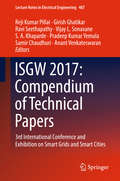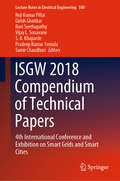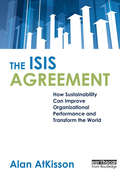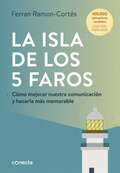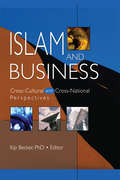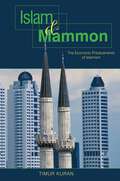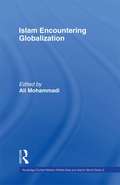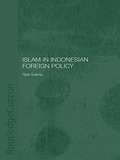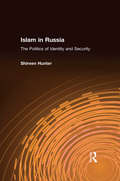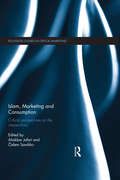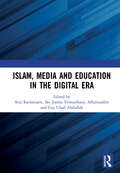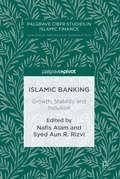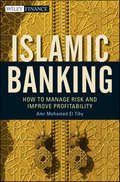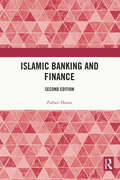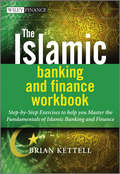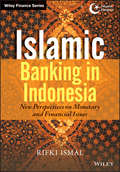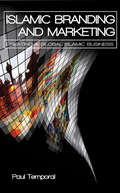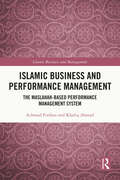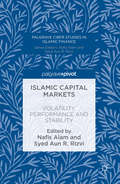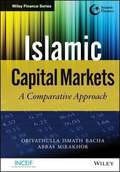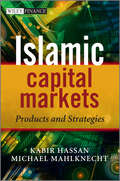- Table View
- List View
ISGW 2017: 3rd International Conference And Exhibition On Smart Grids And Smart Cities (Lecture Notes In Electrical Engineering #487)
by Anant Venkateswaran Samir Chaudhuri Pradeep Kumar Yemula S A Khaparde Vijay L Sonavane Ravi Seethapathy Girish Ghatikar Reji Kumar PillaiThis book presents selected articles from INDIA SMART GRID WEEK (ISGW 2017), which is the third edition of the Conference cum Exhibition on Smart Grids and Smart Cities, organized by India Smart Grid Forum from 07-10 March 2017 at Manekshaw Centre, Dhaula Kuan, New Delhi, India. ISGF is a public private partnership initiative of the Ministry of Power, Govt. of India with the mandate of accelerating smart grid deployments across the country. This book gives current scenario updates of Indian power sector business. It also highlights various disruptive technologies for power sector business.
ISGW 2018 Compendium of Technical Papers: 4th International Conference and Exhibition on Smart Grids and Smart Cities (Lecture Notes in Electrical Engineering #580)
by Reji Kumar Pillai Girish Ghatikar Ravi Seethapathy Vijay L. Sonavane S. A. Khaparde Pradeep Kumar Yemula Samir ChaudhuriThis book presents selected articles from India Smart Grid Week (ISGW 2018), held on March 5 to 9, 2018, at the Manekshaw Centre, New Delhi, India. It was the fourth conference and exhibition on smart grids and smart cities organized by the India Smart Grid Forum (ISGF), a Government of India public–private partnership, tasked with accelerating smart grid deployment across the country. Providing current-scenario-based updates on the Indian power sector, the book also highlights various disruptive technologies.
The ISIS Agreement: How Sustainability Can Improve Organizational Performance and Transform the World
by Alan AtKissonThis is the must-have book for leaders in business, organizations and government who are scrambling to get a grip on sustainability while improving performance in the era of climate change. Renowned business and sustainability consultant Alan AtKisson distils decades of wisdom and experience into this highly readable and motivational work. Covering theory and practice, obstacles and opportunities, case studies and poignant personal anecdotes, The ISIS Agreement draws the reader ever deeper into a global 'conspiracy of hope.' The core of the book is AtKisson's potent Accelerator, adopted for use in dozens of countries by business, governments, and organizations such as UNEP. A comprehensive toolkit that helps integrate sustainability into organizations, initiatives and plans, it can be used by any group, organization, business, community or region, in virtually any context. Central to the Accelerator is the potent ISIS (Indicators, Systems, Innovation, Strategy) method that teaches leaders how to create a whole-systems view of their organization, to identify and understand blockages and opportunities, and to leverage the potential for innovative change that adds value and accelerates progress towards sustainability.
La isla de los 5 faros (edición ampliada y actualizada): Cómo mejorar nuestra comunicación y hacerla más memorable
by Ferran Ramón-CortesEdición ampliada y revisada del libro de referencia de la comunicación personal que ya ha conquistado a más de 100.000 lectores. «Vete a Menorca y, cada noche, dedícate a observar lo que sé que tanto te gusta: los faros. Ellos pueden enseñarte mejor que yo. Obsérvalos, sin prisas, con los ojos bien abiertos.» Esta es la sorprendente sugerencia que, tras una mediocre presentación en público, Ferran recibe de Max, su viejo amigo y profesor. Y, sin dudarlo dos veces, decide seguir el consejo al pie de la letra e inicia un recorrido por los cinco faros principales de la isla de Menorca, que le descubrirán cómo mejorar su comunicación y hacerla más memorable. Observándolos con detenimiento, Ferran encuentra en cada faro una clave que le ayudará a que sus mensajes lleguen con claridad y efectividad a sus destinatarios Esta pequeña historia será de utilidad a todos aquellos que en algún momento de nuestra vida tenemos que hacer llegar claro nuestro mensaje a los demás, tanto a nivel personal como profesional, con nuestros hijos, nuestros clientes, nuestros compañeros de trabajo o nuestros alumnos. «Este es un libro para comunicar. Para comunicarse. Delante de mil personas o de dos. En el trabajo o en nuestra vida personal. Los secretos son los mismos.»Ferran Ramon-Cortés Reseñas:«La isla de los 5 faros es una invitación magistral a convertirnos en grandes comunicadores. Ferran nos lleva, a través de una historia inspiradora, cálida y cercana, a encontrar las claves de la comunicación altamente efectiva.»Rosa Moreno, Directora de Recursos Humanos & Comunicación Corporativa de Grünenthal Pharma «Cinco faros, cinco claves, cinco historias. Una isla, un escritor y un libro. Un libro claro y sencillo de obligada lectura para todos.»Guayente Sanmartín, Vicepresidenta Global y Directora General 3D Multi Jet Fusion de HP «Pocas cosas hay tan humanas y centrales como comunicarnos. La isla de los 5 faros nos orienta en este arte.»Sergi Aulinas, Director General de Laboratorios Gebro Pharma «En las organizaciones, el talento sin habilidades de comunicación es como la potencia sin tracción.»Narcís Roura, Director General de PepsiCo SWE
Islam and Business: Cross-Cultural and Cross-National Perspectives
by Kip BeckerKeep up with management issues in the rapidly changing Islamic business world! Islam and Business: Cross-Cultural and Cross-National Perspectives reviews important changes, cross-cultural differences, and management issues in the turbulent Islamic business environment. With the shift from government ownership of companies and commodities toward more open markets and the product/service diversification that this change brings, the need to understand how business is done in these countries is more vital than ever before. The research in this book will help you understand the impact of Westernization upon business practices in Islamic nations. With contributions from experts on four Islamic business environments (Turkey, Jordan, Egypt, and Lebanon), this book: provides a framework to guide corporations in policy and strategic planning examines the impact of Western reforms on selected Islamic business sectors discusses the training, leadership, and management development needs of companies doing business in or with Islamic nations Section 1: Business in Turkey presents: a framework for corporate policy making and for strategic planning activities an assessment of what can cause strategic alliances to succeed or to fail-illustrated by a case study of the relationship between Turkish Airlines and the Qualiflyer Group-this study considers the question in terms of goals, partner selection, alliance management, and areas of cooperation an examination of value-at-risk (VaR) models that can be used to compute market risk for financial institutions-with a study of crisis scenarios as applied to the four largest Turkish banks Section 2: Business in Jordan presents: a study of the impact Westernization has had on the efficiency of Jordanian commercial banks an examination of current practices and procedures for management training and development (MTD) needs in public and private organizations in Jordan-and suggestions for future improvements an exploratory study of how national and regional socio-cultural values affect organizational culture-considering such factors as Power Distance (PD), Uncertainty Avoidance (UA), the Individualism-Collectivism (IDV) dimension, and the Masculinity-Femininity (MAS) dimension, as well as power culture, role orientation, achievement culture, and the support-oriented organization Section 3: Business in Egypt and Lebanon presents: a comprehensive model of relationships between transactional and transformational leadership trust in terms of organizations, organizational justice, intention to leave, and organizational citizenship behavior-using data supplied by 179 middle and direct level managers in 17 private Egyptian organizations an analysis of the factors affecting the advancement of the Lebanese tourism industry, which has suffered tremendously in the wake of civil war and political unrest The information in Islam and Business will be helpful to anyone practicing management or studying how management works in the Islamic world. Make it a part of your professional/teaching collection today!
Islam and Mammon: The Economic Predicaments of Islamism
by Timur KuranThe doctrine of "Islamic economics" entered debates over the social role of Islam in the mid-twentieth century. Since then it has pursued the goal of restructuring economies according to perceived Islamic teachings. Beyond its most visible practical achievement--the establishment of Islamic banks meant to avoid interest--it has promoted Islamic norms of economic behavior and founded redistribution systems modeled after early Islamic fiscal practices. In this bold and timely critique, Timur Kuran argues that the doctrine of Islamic economics is simplistic, incoherent, and largely irrelevant to present economic challenges. Observing that few Muslims take it seriously, he also finds that its practical applications have had no discernible effects on efficiency, growth, or poverty reduction. Why, then, has Islamic economics enjoyed any appeal at all? Kuran's answer is that the real purpose of Islamic economics has not been economic improvement but cultivation of a distinct Islamic identity to resist cultural globalization. The Islamic subeconomies that have sprung up across the Islamic world are commonly viewed as manifestations of Islamic economics. In reality, Kuran demonstrates, they emerged to meet the economic aspirations of socially marginalized groups. The Islamic enterprises that form these subeconomies provide advancement opportunities to the disadvantaged. By enhancing interpersonal trust, they also facilitate intragroup transactions. These findings raise the question of whether there exist links between Islam and economic performance. Exploring these links in relation to the long-unsettled question of why the Islamic world became underdeveloped, Kuran identifies several pertinent social mechanisms, some beneficial to economic development, others harmful.
Islam and the Path to Human and Economic Development
by Abbas Mirakhor Hossein AskariThis book briefly surveys the evolution of the Western concept of development, recognizing the wider dimensions of human and economic development and the role of institutions and rules, which has moved toward the vision and the path of development envisaged in Islam.
Islam Encountering Globalisation (Durham Modern Middle East and Islamic World Series #Vol. 2)
by Ali MohammadiOne of the greatest dilemmas facing Muslims today is the fact that Muslim culture is often seemingly incompatible with the culture of the modern Western world, and the features associated with it - technological progress, consumerism, and new electronic communication, all of which have the potential for a homogenizing effect on any culture. This book explores many key aspects of the globalisation process, discussing how Muslim countries are coping with globalisation, as well as considering how the West is responding to Islam.
Islam in Indonesian Foreign Policy: Domestic Weakness and the Dilemma of Dual Identity (Politics In Asia Ser.)
by Rizal SukmaThis companion volume to the highly successful Islam in Malaysian Foreign Policy explores the extent to which foreign policy in the world's largest Muslim nation has been influenced by Islamic considerations.
Islam in Russia: The Politics of Identity and Security
by Shireen HunterThis richly detailed study traces the shared history of Russia and Islam in expanding compass - from the Tatar civilization within the Russian heartland, to the conquered territories of the Caucasus and Central Asia, to the larger geopolitical and security context of contemporary Russia on the civilizational divide. The study's distinctive analytical drive stresses political and geopolitical relationships over time and into the very complicated present. Rich with insight, the book is also an incomparable source of factual information about Russia's Muslim populations, religious institutions, political organizations, and ideological movements.
Islam, Marketing and Consumption: Critical Perspectives on the Intersections (Routledge Studies in Critical Marketing)
by Aliakbar Jafari Özlem SandikciIn recent years, a critically oriented sub-stream of research on Muslim consumers and businesses has begun to emerge. This scholarship, located both within and outside the marketing field, adopts a socio-culturally situated approach to Islam and investigates the complex and multifaceted intersections between Islam and markets. This book seeks to reflect various unheard and emerging critical voices from within the Muslim world, and provide a series of critical insights on how, if and why Islam matters to marketing theory and practice. It questions the existing assumptions and polarising discussions which underpin the portrayal of Islam as the ‘other’ of Modernity, while acknowledging that Muslims themselves are partially responsible for creating stereotyped representations of Islam and ‘the Muslim’. This wide-ranging and insightful collection will advance emerging critical perspectives, and provide new insights that will influence the generation and application of knowledge in the context of Muslim societies. It will open up fresh conversations for scholars in marketing as well as the broader humanities and social sciences.
Islam, Media and Education in the Digital Era: Proceedings of the 3rd Social and Humanities Research Symposium (SoRes 2020), 23 – 24 November 2020, Bandung, Indonesia
by Atie RachmiatieThe proceedings of the Social and Humanities Research Symposium (SoRes) shares ideas, either research results or literature review, on islam, media and education in the digital era. Some recent issues consists of innovative education in the digital era, new media and journalsm, islamic education, human wellbeing, marketing and fintech in terms of islamic perspective, economic welfare, law and ethics. It is expected that the proceedings will give new insights to the knowledge and practice of social and humanities research. Therefore, such parties involved in social and humanities research as academics, practitioners, business leaders, and others will acquire benefits from the contents of the proceedings.
Islamabad and the Politics of International Development in Pakistan
by Markus DaechselThis is a highly original account of the design and development of Pakistan's capital city; one of the most iconic and ambitious urban reconstruction projects of the twentieth century. Balancing archival research with fresh, theoretical insights, Markus Daechsel surveys the successes and failures of Greek urbanist Constantinos A. Doxiadis's most ambitious endeavour, Islamabad, analysing how the project not only changed the international order, but the way in which the Pakistani state operated in the 1950s and 1960s. In dissecting Doxiadis's fraught encounter with Pakistani policy makers, bureaucrats and ordinary citizens, the book offers an unprecedented account of Islamabad's place in post-war international development. Daechsel provides new insights into this period and explores the history of development as a charged, transnational venture between foreign consultants and donors on the one side and the postcolonial nation state on the other.
Islamic Banking
by Nafis Alam Syed Aun R. RizviThis book focuses on current issues impacting the Islamic banking system globally. The contributions introduce readers to existing research and literature in the field and highlight areas of potential scholarly development within Islamic banking studies. The chapters are a variety of case studies, theoretical reviews, and empirical research within the world of Islamic banking. The contributions analyse new developments within Islamic banks from OIC member countries, Malaysia and the GCC. Particular attention is paid to the formative insolvency case of Arcapita Bank in chapter 6. Other chapters provide detailed discussion of the structures, marketing activities and products of Islamic banks, and contrast them with those of counterpart conventional banks. Through this edited collection, readers are given expert insight into contemporary, critical issues facing the growing sphere of Islamic banking.
Islamic Banking
by Amr Mohamed El Tiby AhmedA detailed look at the fast-growing field of Islamic finance and banking The guiding principle of Islamic finance has existed throughout Islamic history, yet modern Islamic banking has been around for a relatively short period of time. Author Amr Mohamed El Tiby is an expert in this field, and with this new book, he reveals how you can benefit from the use of Islamic banking strategies in your financial endeavors. Engaging and accessible, Islamic Banking shows the impact this approach has made on conventional banking since the 1950s, and why it's such a big player in the current market. It offers a unique look at various aspects of this field, including the salient features of Islamic banking that distinguishes it from non-Islamic banking, the development of the regulatory bodies and supervisory agencies that support the Islamic banking system, and much more. It also explores the nature of risk in Islamic banking and the issues of capital adequacy, corporate governance, transparency, and risk associated with Islamic banking. Discusses the history and development of Islamic finance Offers straightforward strategies for implementing Islamic finance into your business activities Sheds light on the effect of the global economic crisis on Islamic banks versus conventional banks Filled with in-depth insights and expert advice, this detailed analysis of Islamic finance will help you gain a firm understanding of how effective this proven approach can be.
Islamic Banking
by Zubair Iqbal Abbas MirakhorIslam proposes that the banking systems that operate on the basis of an ex ante fixed rate of interest to replaced by a profit-sharing system in which the rate of return to the financial resources is not known and is not fixed prior to the undertaking of the transaction. While in Islam interest is forbidden, trade and profits are permissible and in fact encouraged. The papers in this volume all address one or more of the basic questions at the theoretical level. The represent a start in the attempt to introduce rigor into the analysis of Islamic banking and finance, thereby clarifying the nature of the basic relationships underlying the system.
Islamic Banking and Finance: Second edition
by Hasan ZubairThis book discusses the nature and theories which govern systems of Islamic finance including its most distinctive features and its relationship with conventional financial institutions. It explores the nature and role of money in modern economies and elaborates on the process of credit deposit creation, trade cycles and instruments for the creation of value in financial markets through the perspectives of Islamic finance. The author explains its characteristics, especially the rationale for the lack of interest-based financial activities. He examines the intrinsic ethical and humanistic frameworks that govern financial theories and practices and the models for the creation of value, risk-sharing and socially responsible investing, as well as the governance and regulation that these systems follow. The author also does a comparative assessment of conventional financial systems with Islamic finance with relevant examples, assesses the performance of Islamic systems and examines existing and expanding markets for Islamic finance. Lucid and cogent, this book is useful for scholars and researchers of Islamic finance, Islamic studies, economics, banking and finance in general.
The Islamic Banking and Finance Workbook
by Brian KettellThe ongoing turbulence in the global financial markets has drawn attention to an alternative system of financial intermediation: Islamic banking and finance. This is now one of the fastest growing sectors within the market place and has, so far, remained on the sidelines of this unrest. Since the inception of Islamic banking thirty years ago the number and reach of Islamic financial institutions worldwide has risen significantly. Institutions offering Islamic financial services constitute a significant and growing share of the financial system in several countries, and market participants everywhere are joining the race to study and be a part of this emerging financial system.The Islamic Banking and Finance Workbook is a one-of-a-kind workbook on the topic, enabling readers to test their understanding of Islamic banking and finance concepts. Although suitable as a standalone learning tool, the book is designed to test the information covered in the companion book, Introduction to Islamic Finance and Banking, and covers the fundamentals of Sharia'a law, the Islamic contracts interpretations and definitions, Murabaha, Mudaraba, Musharaka, Istisna'a, Salam and Ijara modes of finance, Takaful and much more. Emphasis is placed on mini case studies, multiple choice questions and tests of the basic concepts. It also includes a full answer key and brief chapter summaries, as well as learning objectives.The Islamic Banking and Finance Workbook is an essential learning tool for students and practitioners who want to test their knowledge of the rapidly growing world of Islamic banking and finance.
Islamic Banking in Indonesia
by Rifki IsmalA comprehensive overview of key developments in Islamic bankingIn Islamic Banking in Indonesia, renowned economist Dr. Rifki Ismal explores current issues in Islamic banking and financial products with a particular focus on the danger of liquidity risk in Indonesia. It approaches liquidity risk from the conventional perspective of international banking standards, as well as from the Islamic banking perspective. Dr. Ismal also covers the issues of asset-liability balancing, liquidity risk index, organizational structures for managing liquidity, industrial analysis, withdrawal risk, bankruptcy risk, moral hazard risk, and market risk.Compiling all the latest academic research on liquidity risk and other risks in Islamic banking, the book provides a theoretical foundation for managing risk that will is highly useful for researchers on Islamic banking and practitioners and academics.Written by a renowned expert on Islamic banking who works on monetary policy at the central bank of IndonesiaCovers the latest developments in Islamic banking, particularly liquidity risk, for a rapidly expanding marketIdeal for European and American readers, in addition to Asian readers, who need a fuller understanding of Islamic banking institutions, markets, and productsWith the latest academic research and the expertise of a leading practitioner in Islamic banking, this book offers in-depth coverage of the most pressing issues in the field.
Islamic Banks and Financial Institutions: A Study Of Their Objectives And Achievements (Palgrave Macmillan Studies in Banking and Financial Institutions)
by Fayaz LoneThis book is a study of the objectives of Islamic Finance in the modern banking space and offers insight into the effects of changes and developments occurring in Islamic banking products and services.
Islamic Branding and Marketing
by Paul TemporalIslamic Branding and Marketing: Creating A Global Islamic Business provides a complete guide to building brands in the largest consumer market in the world. The global Muslim market is now approximately 23 percent of the world's population, and is projected to grow by about 35 percent in the next 20 years. If current trends continue, there are expected to be 2. 2 billion Muslims in 2030 that will make up 26. 4 percent of the world's total projected population of 8. 3 billion. As companies currently compete for the markets of China and India, few have realized the global Muslim market represents potentially larger opportunities. Author Paul Temporal explains how to develop and manage brands and businesses for the fast-growing Muslim market through sophisticated strategies that will ensure sustainable value, and addresses issues such as: How is the global Muslim market structured? What opportunities are there in Islamic brand categories, including the digital world? What strategies should non-Muslim companies adopt in Muslim countries? More than 30 case studies illustrate practical applications of the topics covered, including Brunei Halal Brand, Godiva Chocolatier, Johor Corporations, Nestle, Unilever, Fulla, Muxlim Inc, and more. Whether you are in control of an established company, starting up a new one, or have responsibility for a brand within an Islamic country looking for growth, Islamic Branding and Marketing is an indispensable resource that will help build, improve and secure brand equity and value for your company.
Islamic Business and Performance Management: The Maslahah-Based Performance Management System (Islamic Business and Management)
by Achmad Firdaus Khaliq AhmadThis unique book discovers a new dimension in the study of strategic and performance management in Islamic Business studies. It addresses the missing link of spirituality from modern-day organizational structure in the presence of high-tech pressure in all areas of human endeavours. The authors propose an integrated study of Islamic business approach to strategic and performance management systems to achieve sustainable organizational performance. The book explores employees’ wellbeing and organizations’ perceiving work environment as a spiritual pathway to cultivate values in Islamic business ecosystem to sustain humanity. It is all about care, empathy, and sustenance of others, about truthfulness and management being truthful to themselves and others and endeavouring to live their values more effusively while performing their work. The book stresses the impact of spirituality in performance management, concluding that for any organization to run efficiently, spirituality is the core component to attain happiness, contentment, and success. The book will be of interest to a variety of management scholars, including those researching and studying performance management, talent management, strategic management, and business ethics.
Islamic Capital Markets
by Nafis Alam Syed Aun R. RizviThis book addresses contemporary empirical issues in Islamic stock markets including volatility, efficiency and Sukuk defaults. The studies contained within this book consider a combination of pure Islamic stock markets and comparative studies, with reference to their conventional counterparts. The authors provide up-to-date, robust, accurate, reliable empirical enquiries addressing current issues of stock markets as well as providing up to date information and statistics to support future development and research. The book also covers a chapter on the current trends in research in Islamic capital markets, which analyses some recent and leading works to highlight and indicate the gaps in research that require further exploration. This book will be of value to all those who wish to gain a more thorough understanding of research in Islamic capital markets and the major topics in the field.
Islamic Capital Markets
by Obiyathulla Ismath Bacha Abbas MirakhorA comprehensive examination of Islamic capital marketsTaking a comparative approach to the subject, this text looks at the similarities and differences between Islamic capital markets and conventional capital markets. The book explains each particular topic from both the conventional and the Islamic perspective, offering a full understanding of Islamic capital markets, processes, and instruments. In addition to a full explanation of Islamic products, this approach also ensures a holistic understanding of the dual markets within which Islamic capital markets operate.Ideal for both students and current practitioners, The New Islamic Capital Markets fills a large gap in the current literature on the subject. Whereas most books in this field cover the topic only superficially, this book offers the depth of coverage and academic rigor needed by professionals and serious students.Fills a gap in the current literature on the subject with comprehensive coverage and in-depth explanationsTakes a comparative and holistic approach to the subject and features case studies from Malaysia, Indonesia, the Middle East, and EuropeWritten by a professor of finance at the International Centre for Education in Islamic Finance (INCEIF)One of the few comprehensive, dedicated guides to the subject available, The New Islamic Capital Markets offers a full understanding of the subject for students and professionals alike.
Islamic Capital Markets
by Kabir Hassan Michael MahlknechtIslamic Finance has experienced rapid growth in recent years, showing significant innovation and sophistication, and producing a broad range of investment products which are not limited to the complete replication of conventional fixed-income instruments, derivatives and fund structures. Islamic Finance represents an elemental departure from traditional interest-based and speculative practices, relying instead on real economic transactions, such as trade, investment based on profit sharing, and other solidary ways of doing business, and aims to incorporate Islamic principles, such as social justice, ecology and kindness, to create investment products and financial markets which are both ethical and sustainable.Products created according to Islamic principles have shown a low correlation to other market segments and are relatively independent even from market turbulences like the subprime crisis. Therefore, they have become increasingly popular with secular Muslims and non-Muslim investors, as highly useful alternative investments for the diversification of portfolios.In Islamic Capital Markets: Products and Strategies, international experts on Islamic Finance and Sharia'a Law focus on the most imminent issues surrounding the evolution of Islamic capital markets and the development of Sharia'a-compliant products. The book is separated into four parts, covering:General concepts and legal issues, including Rahn concepts in Saudi Arabia, the Sharia'a process in product development and the integration of social responsibility in financial communities;Global Islamic capital market trends, such as the evolution of Takaful products and the past, present and future of Islamic derivatives;National and regional experiences, from the world's largest Islamic financial market, Malaysia, to Islamic finance in other countries, including Germany, France and the US;Learning from Islamic finance after the global financial crisis; analysis of the risks and strengths of Islamic capital markets compared to the conventional system, financial engineering from an Islamic perspective, Sharia'a-compliant equity investments and Islamic microfinance.Islamic Capital Markets: Products and Strategies is the complete investors' guide to Islamic finance.
